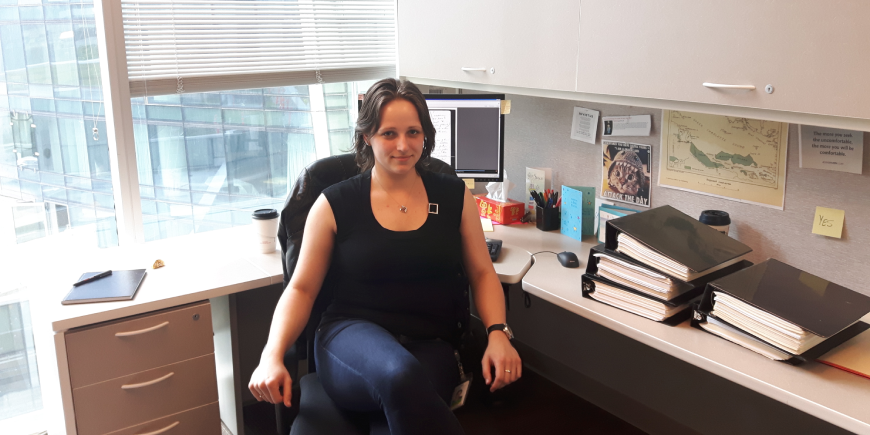
This semester, I worked as a Research Assistant with the Specific Claims Branch of Indigenous and Northern Affairs Canada. This department is tasked with resolving the past grievances of First Nations, usually relating to alleged errors made by Canada in fulfilling its fiduciary or treaty obligations. As a history student, this job was a dream for me – I got to dig through documents, puzzle together chains of events, organize indexes, transcribe hundred-year-old handwriting, and learn more than I could have hoped about Indigenous history in this country. I also learned some tips and tricks to getting hired into the public service – and because I enjoyed this work term so much, I’d like to tell you how to get one, too.
1. Be Sure to Read the Job Posting Carefully
Many students make the mistake of only skimming the job advertisement. This is understandable – you have people to see, papers to write, and exams to study for. However, for a government position, not reading the job posting thoroughly will almost certainly doom your application. The job posting is crucial because it tells you what the criteria are. The key thing to remember about federal government applications is that they are designed to be as objective as possible. Every decision must be justified, quantified and transparent, meaning that there is an exhaustive list of criteria that must be met by a candidate to get the position. There are no “gut feelings” in government applications – you are either the best candidate for the job, or you are not. This may sound intimidating, but it actually makes it much easier for you because throughout the entire process, all you need to focus on is demonstrating that you meet the Qualifications.
2. The Posting Will Be Divided Into Two Main Sections: Essential Qualifications and Asset Qualifications
The job posting will be divided into two main sections; essential and asset qualifications. Both sections will have key words and phrases that you must pay attention to and reference in your cover letter, your resume, and your interview. The Essential Qualifications are the first and most important points on the list of criteria that you must meet to get the job. These are the basic requirements you must have to be eligible for the position. Throughout the application process, you will need to prove your eligibility by providing detailed explanations of your skills and relevant experience. For example, for my position the
Essential Qualifications were:
-
Enrolment in a relevant post-secondary program of study
-
Effective written and oral communication skills
-
Computer/word processing skills
-
Ability to manage work activities, meet deadlines and work effectively under pressure
-
Ability to research and analyze complex issues
-
Dependability
-
Interpersonal skills
Asset Qualifications are what will set you apart from the pack. They are not strictly necessary for you to get the position, but they may be used to eliminate candidates in a competition where too many applicants have all the Essential Qualifications. For my position, the Asset Qualifications included knowledge of First Nations issues in BC and enrollment in a graduate program. Touch on these points if you have them, but focus on establishing that you have all the Essential Qualifications.
3. Clearly Demonstrate the Essential Qualifications in Your Cover Letter and Resume
Keep in mind that the cover letter, resume, and interview serve different purposes for a government application process than for most other organizations. The cover letter is the first and most important document that lays out your qualifications. The resume is typically used as a secondary source to verify the claims you’ve made in your cover letter: it gives more specific information on your experience, the length of any given employment, and the tasks you performed. In both, the objective is to demonstrate that you have met the Essential Qualifications. These Qualifications will sometimes seem redundant. For example, you might assume that your beautifully written cover letter demonstrates that you have “effective written communication skills,” or that the fact that you’re submitting the application via the Internet proves that you have “computer/word processing skills.” Not so. You should still incorporate these qualifications into your cover letter and your resume, and you will definitely want to bring them up during the interview. I suggest making a point-form list of the requirements and writing at least one sentence on how you fulfill each one. Weave those sentences into your cover letter to make sure you haven’t missed anything.
When writing your cover letter and your resume, it is advisable to use the same phrasing found in the job posting. Remember, the hiring manager will not spend more than a minute or two on your cover letter, and may not even look at your resume if the cover letter is subpar. Make it easy for them to check off all the boxes and put you into the “interview” pile.
4. Be Prepared for a Different Kind of Interview
The interview process can be startlingly different, because it is also designed to be as objective and scientific as possible. The questions are standard for each candidate, and you will not get any prompts or follow-up questions based on your experience. A private-sector employer might ask you to talk about a specific job you’ve done that they consider relevant and want to hear more about – government interviewers will not be able to clarify questions, provide additional information, or give you any hints on what they want to hear. A non-profit employer might structure the interview like a conversation, and discuss ideas or aspects of the job – government interviewers will be so busy writing down (literally) every word you say, they may not have time to even look at you while you’re speaking. At the end of the government interview, the interviewers will give each of your answers a score, and the candidate with the highest cumulative score gets the job.
To prepare for this interview process, look again to the Essential Qualifications. What kind of work are you expected to do? What kind of skills and experience are they looking for? Your job in the interview is to prove your eligibility by explaining the relevance of your experience to the Essential Qualifications. Consider making a list of the Qualifications and writing out one relevant example from your personal experience for each. Remember that you are being graded on each answer, so don’t rush: give the interviewers time to understand how your experience is relevant and why they should hire you. You will usually have about 45 minutes to answer 10 questions, which gives you plenty of time to go into the specifics of your experience. Provide the complete story for every example and describe in detail the situation you were in, the task you had to complete, the action you took, and the result of the project. Most importantly, connect each story with the Essential and Asset Qualifications you are being asked to prove.
5. Do Your Research
Be prepared to answer questions about the branch, sector, and department you are applying for. The government website is very exhaustive and will be an excellent resource, but you should also take a look at recent news articles, press releases, or public statements to get an idea of current priorities. Familiarize yourself with the mandate, the mission statement, any associated organizations, and the policies/processes integral to the department. You don’t need to have them memorized, but you should be able to give a good answer to the question “what do you know about this organization?”
6. Keep Trying
Government positions are notoriously difficult to get, so don’t get discouraged if you don’t make it the first time. These co-op jobs pay well, provide fantastic networking opportunities, and make it much easier to be hired into the public service after graduation. The people you will meet and the professional development prospects you will have are absolutely worth it. So good luck, and remember – demonstrate that you meet the Essential Qualifications!
Beyond the Blog
- Be sure to check out the FASS Co-op homepage for more information on opportunities like Diana's!














